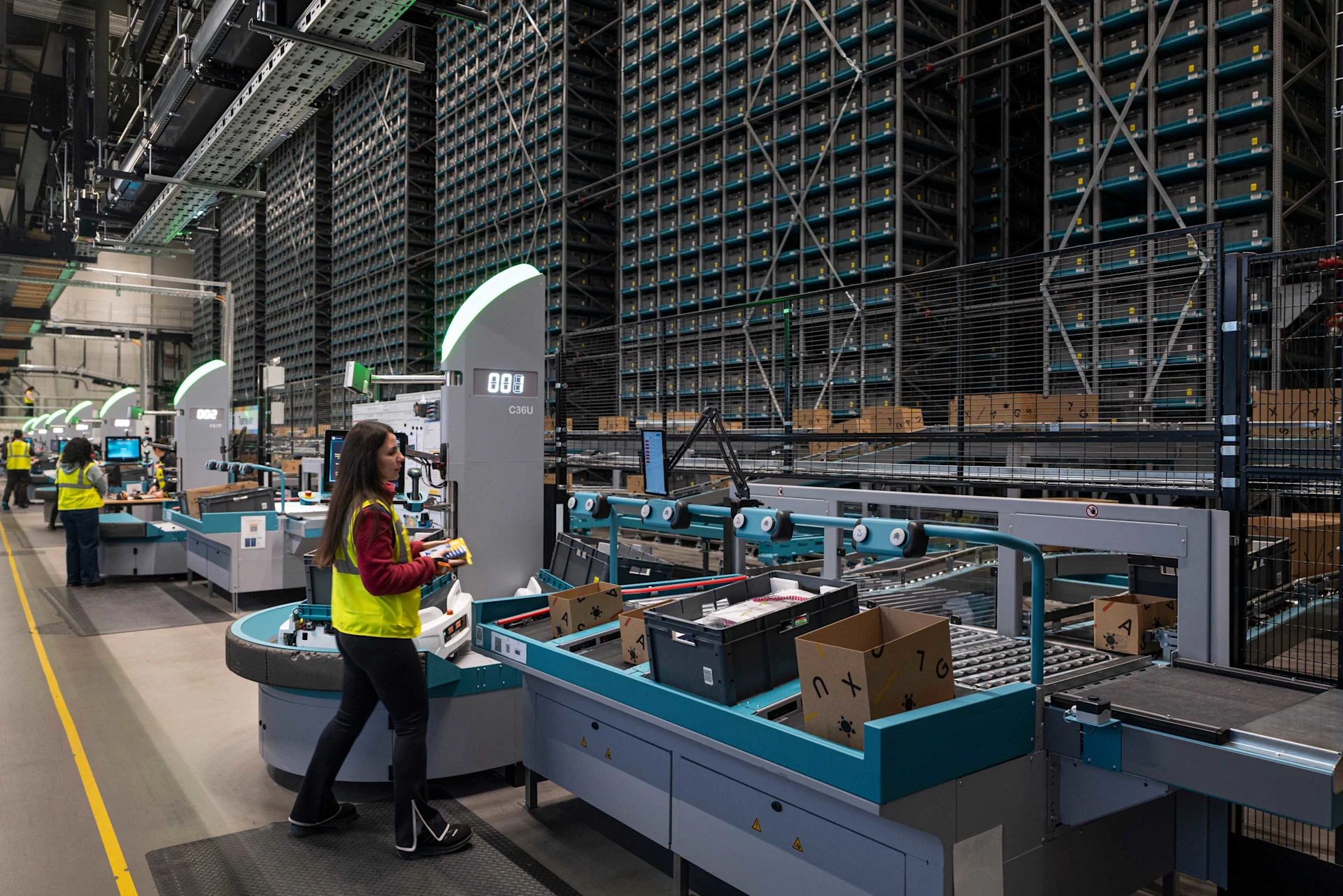
Work environment
Where our presents come from
We visited the huge Digitec Galaxus logistics centre, which is a hive of activity over the Christmas period.
navigation

Work environment
Job-hunting can often be difficult for the over-40s. However, there's no need to panic. Your career can take off again or move in a completely new direction even after you've turned 50. Three people tell their stories.
Sylvie Allamand went through a rough patch. The 55-year-old from Geneva is committed and determined. But she spent four years fruitlessly searching for a new job. "In 2021, I had to close our family business; a roofing company. I had worked there all my life, first as a regular employee, later as the managing director. But the economic situation eventually became untenable. The coronavirus pandemic brought many building projects to a halt or shut them down completely." Sylvie Allamand began applying for jobs in other industries, extending her search further and further - to no avail. All she ever got were rejections.
She isn't alone. Many job-seekers over 50 with good qualifications have great difficulty getting a new job. According to the Swiss State Secretariat for Economic Affairs, people aged 50 and over take an average of seven-and-a-half months to find work. The figure for 15-24-year-olds is just 3.2 months. However, there is also good news: at the end of September 2025, the unemployment rate for 50-64-year-olds was 2.5%, which is below the current national average of 2.8%.

"After all the rejections, I no longer knew what I really wanted, and the regional job centre provided little support for reorientation," Allamand recalls. "What's more, I wasn't even entitled to compensation because I was self-employed. I therefore had to live off my savings." In desperation, Allamand eventually turned to the Qualife Foundation, which offers a special reintegration programme in Geneva for people over 50. "In a meeting with an advisor, I discovered that the Geneva public transport operator was looking for new female bus drivers. I didn't hesitate for a second."
After a job interview, medical exams and psychological aptitude tests, she signed up for a full-time position. "I then spent several months training as a bus driver," she recalls. "For me, being behind the wheel of such a long vehicle was one of the biggest challenges I've ever faced. However, I really like it and was given an incredibly warm welcome."
According to Elisabeth Michel-Alder, a social scientist at EMA Human Potential Development, age-related stereotypes are one of the main reasons why the over-50s are hired less often. "Many younger managers think that 55-year-olds are less physically capable or have difficulties with new technologies, but that's simply not true," she says. "Today's 55-year-olds are nothing like the 55-year-olds of 20 years ago."
The higher costs for older employees aren't a decisive factor either, she adds. Michel-Alder is convinced that companies can structure salaries in such a way that higher pension contributions are less onerous.
The important thing is to get your own career moving. This reduces the risk of being made redundant one day.
Not all over-50s have trouble finding a job, as the case of Nancy Gaudin shows. The 56-year-old businesswoman was keen to take on more responsibility within her company. "I wanted to train further and work longer hours," she explains. When she realised that her employer wouldn't let her, the Lausanne native began looking for a new job. After submitting just one application, she was hired as a trainer for pension advisers at Groupe Mutuel last year. "Even I was surprised how quickly it went," she says.
Her long professional experience was apparently only one factor in her success. Gaudin speaks not only French, but also perfect Swiss German and had undergone further training. "While volunteering, I realised how much I enjoy teaching," the 56-year-old says. She therefore trained as an adult educator in her spare time. "It was exhausting, but it helped me get the job," she recalls. Her age also had its advantages: "My son is grown up. As a result, I no longer have to look after him and can concentrate fully on my work."

Indeed, the over-50s have many aces up their sleeves when changing jobs. "They are generally well aware of their strengths and weaknesses, have plenty of experience and identify more with their employer than many younger people do. This makes them good ambassadors," Elisabeth Michel-Alder says.
Employers therefore shouldn't underestimate this age group. In many of today's companies, employees aged between 50 and 60 make up a significant proportion of the workforce. That's also the case at Migros. Almost 30% of its employees are over 50. That is why the company launched its 50+ Initiative across the entire group. "We support our older employees in consciously managing their remaining working years and further developing their skills in a targeted manner. In this way, we ensure that we will continue to have enough qualified specialists available in the future," explains Barbara Danzl, who heads the initiative. Internal and external training courses, pensions advice as well as health and sports programmes are available.
We support our older employees in consciously managing their remaining working years and further developing their skills in a targeted manner.
"When I was 55, my then boss suggested that I undergo further training to become a retail manager with a Swiss Federal Diploma," Efrem Hugo explains. The aim was for him to become the manager of a larger store. Efrem is now 59 years old and runs the Paradies supermarket in Basel. "Migros paid for my training and allowed me to attend the courses during working hours," Efrem says. Although he appreciated the trust the company placed in him, he thought long and hard about whether he really wanted to embark on a new training programme. In the end, he agreed. He knew that he would have a sought-after profile and it would all be worth the effort. "It's important to keep learning," says Efrem, who began his career at Migros as an apprentice more than 40 years ago.

"It's decisive to gain experience in other teams and functions, even within the same company," employment expert Elisabeth Michel-Alder adds. "You should never stay in one position for too long." Other ideas for older employees include requesting internal internships to get a taste of other departments, making themselves available for job sharing and deputising for a colleague on maternity leave. "The important thing is to get your own career moving. That also reduces the risk of being made redundant one day."
Older employees should also consider how long they want to and are able to continue to work, as well as how many hours a week they will be able to manage. And, of course, when it's time to take on a bit less responsibility or move into a quieter or more advisory position. An ever-increasing number of companies, Migros included, are offering older workers employment models that provide relief. For example, a so-called "bow career", in which a person over 50 gradually hands over their responsibilities to a younger colleague.
Sylvie Allamand, the bus driver in Geneva, isn't thinking about retirement just yet. "I want to train further and get my tram driver's licence in two years' time," she says.
Whether at a desk, in a store or in a laboratory – our work environment is diverse, just like the people behind it. Discover their stories.